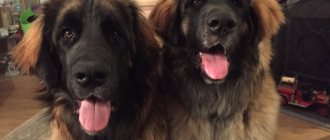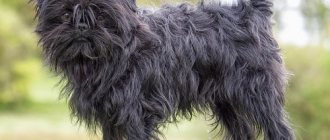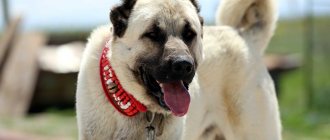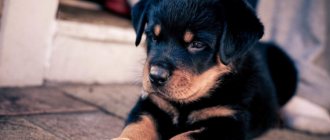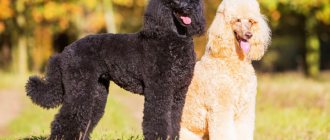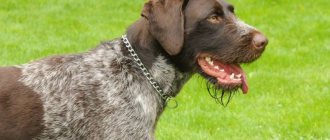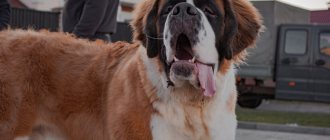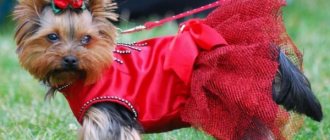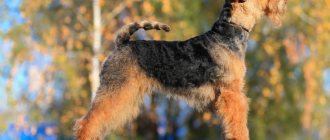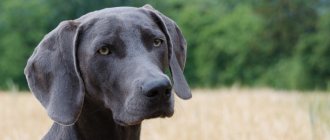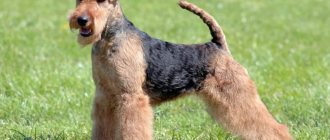- Leonberger
Leonbergers are friendly giants with a calm and even-tempered nature. This is an excellent family dog that gets along well with all family members and other animals. They respond well to training. If necessary, they will notify their owners if strangers are detected, but this is not a guard dog.
- Country of origin : Germany
- Height at withers : female: 65–75 cm, male: 72–80 cm
- Weight : female: 41–59 kg, male: 48–75 kg
- Lifespan : 9-11 years
- Use : companion dog
Purchasing a Leonberger puppy is a responsible and important action that you need to think carefully about before you do it. This is especially true for those people who are going to become truly responsible dog breeders. The question of choice should be approached carefully and without haste, comparing your own habits, daily routine and the nature of the chosen breed. When the future owner has decided on the breed, a new dilemma arises: how to find a bona fide breeder? Here you need to be extremely careful not to become a prematurely disappointed dog owner.
Buying a Leonberger puppy is a very exciting event, because you can say that a new family member will appear. To ensure that the event does not overshadow anything, it is worth taking a responsible approach to choosing a breeder. There are no bad dog breeds; you can simply run into an unscrupulous breeder for whom money comes first. The future owner is at great risk of buying an animal that has a lot of health problems. It is for this reason that you need, first of all, to get to know the breeder well, read reviews about him and the like.
How the breed appeared
Today, there are two versions of the appearance of the Leonberger breed. The first, official, says that the breed was created by the great breeder Essig in 1848. According to the idea of this dog handler, dogs of this breed were to become living symbols of the city of Leonberg. The literal translation of the city's name is the city of the lion.
Therefore, Essig's goal was to create a breed that would be similar in size and appearance to living lions. To do this, he crossed many breeds of large dogs. At first, Essing got a Leonberger with a silver-gray color, and only a few years later he managed to breed a dog with yellow-brown fur, which almost exactly repeated the color of the lion.
According to the second version, which is followed by almost all modern dog handlers, Essing did not create a new breed, but only saved it from extinction. It is based on the fact that a description of the breed was found in records dating back to the 18th century. And the last representatives of this breed, which was struck by distemper, came to Essing. Subsequently, the dog handler not only rewarded the breed, but also achieved its recognition.
Leonberger nurseries
| Nurseries | Federation | City |
| Kennel IZ LION GUARD | RFLS | Moscow |
| Kennel Amiras Platinum | RFLS | Kimry |
| Nursery GREAT BEAR | RFLS | Yaroslavl |
| Kennel Dobry Leonid | OANKOO/Fauna | Moscow |
| Nursery Iz Galkina Gnezda | RFLS | Moscow |
| Nursery Pia Desiderata | OANKOO/Elite | Moscow |
| Nursery Rua Soleil | RFLS | Moscow |
| Nursery CONSTELLATION TAURUS | RFLS | Novosibirsk |
| Taffills Nursery | OANKOO/Fauna | Kazan |
| Kennel FANTASY CHARM | RFLS | Moscow |
Source - https://rkf.online/organizations?organization_type=3&active_rkf_user=false&activated=false
For more information, see the official website of the RKF.
Breed characteristics and character
The main characteristics of the Leonberger dog breed are intelligence, calmness and loyalty. Dogs of this breed are very smart. They always assess the situation around them from the point of view of danger to the owner or the protected area. If there is no direct threat, then the Leonberger will not react in any way to any events surrounding it.
Leonberger on a walk in summer
Therefore, you can safely go out into the city for a walk with such a dog. She will behave confidently and melancholy, but only until a threat appears. In addition, this breed is distinguished by absolute calm. They will not lunge at passers-by or other dogs. They will never bark in vain.
They voice only if there is a need to warn or protect the owner. The calmness of Leonbergers is especially pronounced when communicating with children, who can do whatever they want with the dog, but she will only look at it all with displeasure and try to hide from them when playing with the little ones tires her.
Loyalty to the owner of Leonbergers is simply boundless. This species will never allow itself to be bribed by another person. In addition, if the owner has somehow offended his pet of a given breed, he will almost never harbor a grudge against him.
It is worth noting that the Leonberger dog is quite social. If she is alone for a long time, without communication with her owner or his family, then she becomes lethargic and joyless.
Leonberger loves to swim in the water
In addition, her mood depends on the general emotional situation in the house. If there is fun in the family, then she herself becomes cheerful, if there is shouting and scandal, she becomes nervous. To form the right character, you cannot only rely on natural qualities, since Leonberger puppies are very playful and calm, and intelligence comes to them only with age. Therefore, it is very important to communicate very closely with the puppy at an early age, as well as to engage in its upbringing.
Training
Training and training a dog should begin from early childhood. They quickly grasp any commands. So you can easily teach a Leonberger commands like “lie down”, “come to me”, “place”, “sit”. If you do not have enough experience in training, it is better to contact an experienced instructor.
During the training process, dogs do not tolerate aggression towards them. It is not recommended to shout and hit Leonbergers; they will be distrustful of the offender. It is enough to carry out training in a confident and loud voice.
Breed standard
The standard by which Leonbergers are judged at shows dates back to the mid-20th century. According to it, representatives of this breed have a golden, red-brown or light yellow color, with a dark mask on the face. In addition, a small white spot on the chest is allowed.
The coat should be long, hard and dense, lying close to the body. There should be a collar of wool on the chest and neck, similar to the mane of a lion. The dog's head should not droop too much, have a moderately convex shape, and be of medium size. Lips should not be wet and fit tightly to the jaw.
The Leonberger is a fairly large breed.
The dog's muzzle is round and medium in size. Eye color can be either light brown or dark brown. The eyes are not big. The Leonberger's ears should hang and be rounded at the ends. In addition, they must have medium-length hair.
The ears should be placed high on the head and turned forward. The neck is of medium size. The tail must be positioned low. It must be thick and long. In addition, the tail should under no circumstances be raised above the back, otherwise this will lead to exclusion from the exhibition by the judges.
The dog's paws must be straight, with pronounced elbows. In addition, the Leonberger has a powerful and straight back. A dog will be disqualified if it has an overbite, a short and pointed muzzle, eye problems, wavy hair, light eyes, loose eyelids.
Dossier
Adult height: 65 – 80 cm. Weight: 35 – 50 kg. Color: yellow, red, sand, reddish-brown, as well as all combinations of these colors, always with a black mask. Coat length: long, straight, slight waviness is allowed. Life expectancy: 10 – 12 years. Advantages of the breed: excellent character, powerful equipment, ability to learn quickly. Difficulty of the breed: constant coat care, require frequent walking. Leonberger price: $350 – $1000. Classification: large breed, guard dog, family dog, companion dog.
Maintenance and care
Like any large breed, Leonbergers need space, so private homes are best suited for keeping them, where you can create a large enclosure or simply let them go for a walk in the yard.
It is best to place a bowl of water in a place where it can be easily cleaned up, as they often spill its contents when drinking. The Leonberger breed is a long-haired dog, so the main care is to constantly monitor the dog's coat.
Spring and autumn become a real test for owners of this breed, as molting occurs during this period. In order for the dog’s appearance to be attractive during this period, it is necessary to comb it daily. The rest of the time, you can comb it two to three times a week.
In addition, the Leonberger's coat has the property of not allowing moisture to pass through, so if the dog lives in a house or apartment, it is worth remembering that after a walk in wet weather, it is necessary to wipe it with a towel upon arrival, otherwise there will be puddles throughout the house. It is also necessary to periodically clean the ears, nose and eyes. Paw care is required minimal, as their natural appearance is welcomed.
Teffills
Before you become the happy owner of a puppy of this wonderful breed, read reviews about Leonbergers on the Internet, go to exhibitions to see the dog of your dreams “live”. If, after looking at a photo of a Leonberger, you fell in love with this breed, then meeting them will give you even more joy and positive emotions.
Weigh all the pros and cons: keeping such a giant is quite expensive, in addition, it is not recommended for a Leonberger with his chic, thick “fur coat” to live in apartments; this dog needs space and fresh air. Adequately assess your financial capabilities for raising a puppy and keeping a giant dog, whether you can provide your future friend with decent housing in the house and an area for relaxation and play in a shady area nearby.
The Leonberger is an ideal breed for a large happy family living in a separate house with its own plot!
Where the dog will be comfortable and train in being useful to the family, and relax quietly under the shade of trees.
Don't get a dog if you can't keep it. Don't breed a bitch if you can't sell or donate the puppies. Do not start your own business if you are not 100% sure of paying off all costs...
How to purchase a puppy in our kennel:
1. You can choose a puppy in the kennel after activation, starting from 6 weeks, until 6 weeks we grow quietly, not thinking about new hands and new homes, thinking only about the babies and their mother, paying them attention around the clock, surrounding them with care, perhaps taking you into account verbally, I do not reserve puppies from diapers at suckling age, with my eyes still closed, when the picture of development is not entirely clear to you, give us a little time to get on our feet and see the development of puppies more clearly to me and appear to you in all its glory , so that you see a clearer picture when choosing. During this time, while the kids are growing, you can be in touch to convey to me that your intention to purchase a puppy is serious and responsible. And perhaps during this time we will find mutual understanding and trust in each other to friend.
2. A deposit is paid for the selected puppy, the puppy is marked by me, after activation, all babies have brands in the ear, you can remember your baby by the number of the brand. 3. The date of registration of puppies according to the breeding regulations of the RKF is 45 days. During certification, the puppy is branded, a puppy card is created on it, in which the name, brand, parents and date of birth are entered. In the future, it is exchanged for a pedigree at the RKF office in Moscow. During activation, each puppy is examined by a dog handler and a litter-wide card is filled out. If there are anomalies or defects in the puppies, the dog handler records his comments in the general litter card and makes a note in the puppy card. 4. The puppy can be picked up at 8-9-10 weeks, not earlier, depending on the timing of vaccination, but you must provide your puppy with the proper conditions to allow it to pass quarantine safely. Having agreed on the timing of vaccinations with me, 10 days after revaccination you can start walking (if everything is in order at the age of 3-3.5 months).
5. I prefer to release puppies to new homes only at a safe age for them, no earlier than 8-9 weeks, at the age of 8 weeks the first vaccination is given, a week is quarantined after it to observe the body’s reaction after the first vaccination, if the temperature is normal, appetite and stool are normal, the baby is active and playful, then you can begin to prepare for the meeting with the new parents of the puppy, but do not forget from street walks, we also abstain in the new home until the quarantine passes after revaccination.
6. The puppy, leaving its parental home, receives from me: a puppy card, a veterinary passport with a note about the next vaccination; an individual memo (where I write down my recommendations for feeding and rearing), with telephone numbers and addresses of veterinarians and clinics, if you live in the same city; with an agreement (oral or written) at the request of the owner; the usual food for the puppy upon arrival, although in general, many future owners prepare in advance for the baby’s arrival and the food is already ready, waiting in the wings, all this is discussed, what needs to be prepared for the baby’s arrival, and I am left not only with the money you left in as gratitude for keeping and raising your puppy, but also with a pain in the heart about what the fate of the baby will be and how responsible its future owners will be to the child. 7. Each puppy in my house is examined first of all by me constantly, then each puppy is examined before vaccination by a veterinarian whom I call to the house. During activation, the puppy is also examined by a dog handler. The last time my puppy is examined by the buyer (very carefully) before going out into the world. 8. In my house, the puppy is dewormed 3 times: at 3, 5 and 7 weeks. The most effective anthelmintic is chosen. Worms must be driven away more than once. Don't believe claims that puppies and adult dogs don't have worms. Puppies become infected with worms in utero. Unfortunately, when buying an expectant mother somewhere and from someone (provided that worms were unscrupulously driven away in that house), you will encounter a problem in the future. If the bitch is not given anthelmintics up to 5 weeks, the larvae subsequently become encapsulated in the soft tissues and, under certain conditions, enter the uterus. Subsequently, by driving away the worms, you will kill the sexually mature ones, and those encapsulated in the uterus will lie dormant until pregnancy. With renewed vigor, the worms will reproduce during pregnancy and infect future puppies in utero. If the puppy has not been dewormed, he may have health problems and may face complications during vaccination (intoxication is possible). Anthelmintics are given 7-10 days before each vaccination. 9. Sometimes conflict situations arise. They bought a puppy from you, it was examined by a veterinarian, the future owner, but for various reasons its fate did not work out. And then mutual reproaches appear. It seems to you that the puppy is being raised in the wrong way, and to the buyer that the puppy was purchased sick and genetically poor. STOP. Let's figure it out. I consider myself a very meticulous breeder of my puppies. I love and cherish them, I sleep in the same room with them for the first month, being around them around the clock, conscientiously caring for them and socializing them. When I give puppies into the hands of others, I want their lives to be happy, because all the prerequisites for this were in place. I am ready to communicate with every buyer day and night and give advice. But..People take a puppy into their home, not always imagining what difficulties they may encounter. You need to grow it wisely. First and foremost - take care of the puppy! People tend to rush from side to side. Without listening to the breeder, people who are far from this breed are involved in raising puppies. Any advice is accepted, just not what is needed. Human doctors are used to the fullest (a human doctor can instantly transform into a veterinarian - after all, the anatomy is different). And the food. Recommendations are forgotten, and the puppy becomes a testing ground for testing various types of feeding, tasting brands of all kinds of food. The (mutual) reproaches are increasing, and the puppy is getting worse. Very often, a puppy is adopted by people who already had a dog, or have an old and sick dog. They are accustomed to illnesses, so they believe that they know everything in advance, and treat the puppy as a weak, defenseless creature, blowing off specks of dust from it, limiting it from the necessary stress. Don't get a puppy if you can't raise it to be a big, strong, healthy dog. A puppy is not a momentary whim, it is work. Everyday, hourly, sometimes hard, but very exciting and beloved work together. 10. Don't forget about socialization and training of the puppy. A well-mannered puppy is comfortable for you and your family. Explain to him the rules of your life and routine in a puppy-friendly language. Be patient and tactful. The Leonberger is a dog that does not tolerate rough handling well, do not break it. Negotiate with your dog, it's worth it.
NO SELF-RESPECTING BREEDER WILL BE ABLE TO PREDICT MANY THINGS IN A SMALL PUPPY: unfortunately, the breeder is NOT CLAIRVOYANT...
Dear friends, possible future buyers, this is just for you!
1. PUPPIES ARE NOT BORN ELITE.
ADULT DOGS BECOME ELITE based on the quality of the offspring born from them (previously, this title was assigned to a bitch and a male based on the quality of the offspring exhibited at the exhibition. For both a male and a female, the number of offspring from different matings is different, so parents of puppies could only receive the title ELITE upon reaching the age of three years for a male and four years for a female.) - heard at a cynology course :)
2. SHOW IS NOT BORN A DOG, BUT BECOME
only based on exhibition success and only after 9 months, when the puppy moves to the junior class. Showing a puppy in the puppy and baby class is good training for the future champion, provided that after he has grown from puppy to junior, his teeth have changed correctly, his bite is normal, his height is standard, so that he has not overgrown or undergrown, height in the standard, and in juniors it can be at the upper limit in the standard, but in the intermediate or open class it is not as mature as required in the standard and that’s it, no longer for exhibitions, they will be removed for being undersized - overweight or overweight or underweight, which If only the dog weren't beautiful.
For a show dog, show charisma is needed and temperament is very important, not all dogs are capable of this, they are prepared and taught specifically for exhibitions, children also did not immediately begin to write, read and count, they were taught this. Exhibitions for dogs are the same school as for children, and for service breeds the main school is training in OKD, etc., and exhibitions are in the background.
THEREFORE, A RESPECTABLE BREEDER CAN ONLY ASSUME AND WRITE THAT THE LITTLE PUPPY IS CURRENTLY WITHOUT DEFECTS AND IS SUITABLE FOR SHOWING AND BREEDING IF DESIRED, but to assert this at 2-3 months that this show-class puppy will be a star of the ring is considered too self-confident approval by the breeder.
3.IF YOU WANT A REALLY SHOW DOG OR A DOG WITHOUT DISADVANTAGES FOR BREEDING—
YOU SHOULD ONLY TAKE A GROWN DOG NOT EARLIER! 10 MONTH (after changing all the teeth), but you may already be a stranger to a dog at that age, do not forget, dogs are very loyal animals and the owner of this already grown-up dog will remain the one who raised it until these 10 months... do you need a show hero with longing in his eyes for his former owner and his usual place... as they say, the sooner, the better for a little puppy to get used to a new home and a new owner (although at this point not everything is so clear - adult dogs also came to us personally; unfortunately, they were left without an owner on the street:((((and they were very grateful to our attention and care...the stress from the new place and the new owner was minimal, again, if you make an effort and create the best conditions, investing your soul.
If you need a dog for breeding, many people start with this very condition: we need a dog! Nice show dog! Need a show class dog for breeding! Then, even after the exhibition, and after he has been untied and wait for the bitch to be pregnant from him, look for such a skillful and high-quality sire
